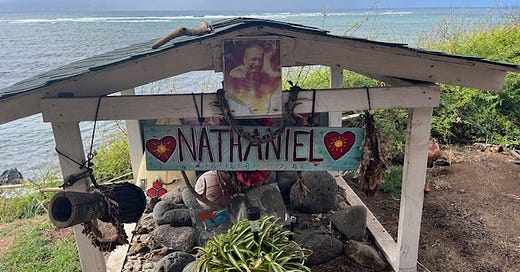My girlfriend Laurie and I recently returned from 10 wonderful days on Molokai, one of Hawaii’s smallest and least-populated islands. It is touted in travel guides as “the Hawaii of 50 years ago,” an appropriate description. There is not a chain store nor restaurant to be found, not one traffic signal, and the maximum speed limit anywhere on the island is 45 miles per hour. Laurie and I reveled in the slow pace, the near absence of other tourists, and the pristine beauty of Molokai’s unspoiled beaches and verdant canyons. Truly a tropical paradise.
We found, however, that even paradise is not immune to modern incidents of societal tragedy. Scattered along King Kamehameha V Highway near our Air B&B condo, and in other spots in the main town of Kaunakakai, we noticed numerous signs and stickers proclaiming, “Justice for Nathaniel.” Some of the larger signs featured queries such as “What Crime Was Committed?” and “Why Did He Have to Die?” This led us to assume that someone named Nathaniel likely met his demise at the hands of local law enforcement. A Google search confirmed our assumption, and I gleaned the following information from various local media reports.
Nathaniel Naki, a 40-year-old native of Molokai, was homeless and suffered from mental illness. As a result of past confrontations, his parents were granted a temporary restraining order. Raymond K. Naki (Nathaniel’s father) was quoted as saying the order was needed to protect the family’s dogs and to “enforce” Nathaniel’s medication and obtain assistance to hospitalize him. On April 30, 2023, Nathaniel allegedly violated that order by his presence near the family home, and police were called.
Two officers from the Maui County Police Department responded and confronted Nathaniel near the car in which he was living at the time, parked along the highway on Molokai’s east end. (The whole of Molokai is considered part of Maui County, despite being a separate island.) Holding a two-foot machete, Nathaniel responded aggressively and began to advance toward the officers, ignoring their repeated orders to halt and to drop the weapon, which Nathaniel was holding under his arm. A portion of the police bodycam footage released to the public confirms this. One of the officers deployed a taser to no effect and, as Nathaniel advanced to within “two arms’ length” of the officers, each opened fire at point-blank range and Nathaniel fell to the pavement.
Accounts of the incident from the police department and from the Naki family differ significantly. The family asserts that Nathaniel was not acting in a threatening manner with the machete and therefore questions the need for the use of lethal force. Further, they claim that, after he was shot, Nathaniel was “left to die in the road” with no medical attention. Statements by the police department maintain that the officers acted wholly within departmental policy “to ensure their safety and that of the community.” Further, the department claims that medical aid was rendered by the officers and by an off-duty firefighter, and that an ambulance was summoned.
Subsequent to the incident, the family obtained legal counsel and filed a lawsuit in U.S. District Court in Hawaii, claiming “malicious, willful and wanton conduct by police; negligent infliction of emotional distress, pain and suffering to Nathaniel; wrongful death and intentional infliction of emotional distress to Nathaniel’s family.” As of November of last year (the most recent media accounts I could find), results of the lawsuit remain pending.
In addition to the legal issues in play, and the fact that Nathaniel’s shooting by police was the first such fatality in island history, the tragic incident became a call to action for greater mental health awareness and better access to needed services on Molokai. Two weeks after the shooting, a miles-long citizen motorcade filled the Kamehameha V highway, and a peaceful rally was held in downtown Kaunakakai on May 14, 2023, which would have been Nathaniel’s 41st birthday. Speaking at the rally, County Councilwoman Keani Rawlins-Fernandez noted the lack of mental health services on the island and that, as a result, drug and alcohol abuse often take the place of those services. In Nathaniel’s case, he had stopped taking the medication that had been prescribed for his condition.
May is National Mental Health Awareness Month, established in 1949 by the National Council for Mental Wellbeing to “highlight the importance of mental wellbeing, educate the public, reduce stigma, and provide support for those with mental health conditions.” Despite some progress, more than 30 million people in the U.S. lack access to comprehensive, high-quality mental health care. Nationally, one in five young people has a mental, emotional, developmental, or behavioral disorder, and one in five adults lives with a mental illness.
The tragic death of Nathaniel Naki (and the thousands of similar cases nationwide) provides stark evidence of the challenge our nation faces concerning mental health. The National Council for Mental Wellbeing offers a variety of resources on its website, including a downloadable “Mindful Moments Checklist.” Any step towards mental health awareness is a step in the right direction. Perhaps, in some way, it is also a sliver of justice for Nathaniel.





Sad tale beautifully told.